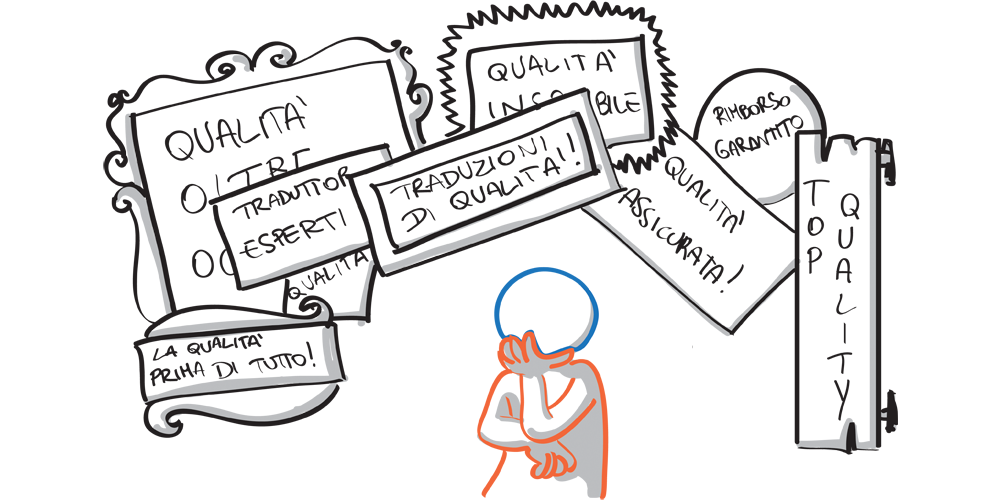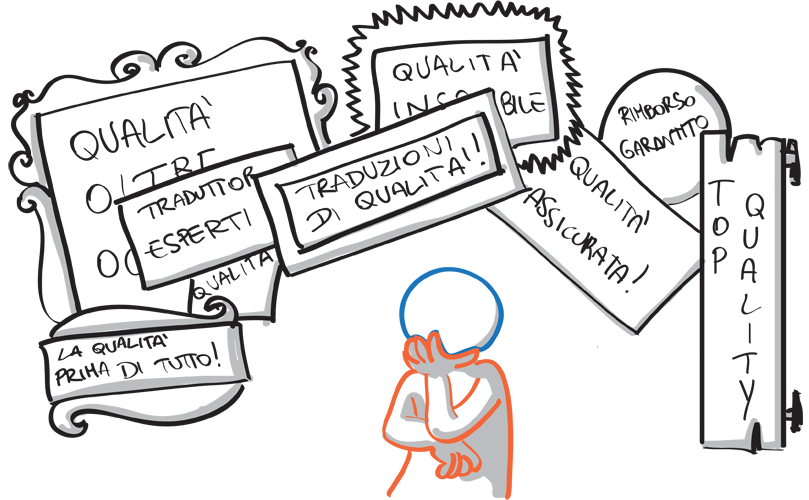Quality professional translations (apparent)
What does “quality professional translation” mean? A translation that is faithful to the last letter is generally considered “quality” – but would it be the case if the translation was going to be published in a magazine with easily readable articles that flow smoothly? Conversely, the translation of a technical text adapted to be smooth to read could be defined a “quality” job – but would it apply even if the translation was meant for scientific research, where the use of correct terminology is of the utmost importance?
“Quality professional translation” is by itself a positive term, but it tells nothing about the actual value of the service: it makes perfect sense to state that a translation costs “1,000” Euros and that it takes “15” days to complete, but “whether” and “how much” a service is “quality”, in other words good or better than others, cannot be deduced from labels such as “quality translation”, “top quality”, “premium service”, and so on.
 To ascertain the quality – meant as value – of a product it is necessary to measure its ability to meet the requirements of the buyer (fitness for use). In this respect, in order to offer “quality translations” it is necessary to start with the analysis of the customer’s requirements, thus understanding the actual benefits of the translation: it will then be straightforward to measure if and how the benefits have been attained and how much the translation has proven to be “quality”.
To ascertain the quality – meant as value – of a product it is necessary to measure its ability to meet the requirements of the buyer (fitness for use). In this respect, in order to offer “quality translations” it is necessary to start with the analysis of the customer’s requirements, thus understanding the actual benefits of the translation: it will then be straightforward to measure if and how the benefits have been attained and how much the translation has proven to be “quality”.
Therefore, it makes a lot more sense to think of the quality of the translation as its benefits, avoiding choices that look good in abstract while focusing on the actual needs. By looking beyond the empty suggestion of “quality translations”, we will find that there are many “qualities (benefits) of the translation”, from which to choose the most appropriate (accuracy, precision of technical language, smooth and readable style, ability to persuade, basic understanding, etc.). We should also point out that such benefits can be so different from each other that it is impossible to provide all of them at once: a translation meant for basic understanding only will be quick and cheap, but as a result it will not be fully accurate.
Of course the customer will typically have a perfect understanding only of time and budget requirements, so it should be up to the agency to recommend solutions that can bring to light further needs: unfortunately, building solutions that are optimized to different needs requires organizational and financial efforts that not every agency can put forth. This explains the boom of “quality translations” announcements on the Internet, but there are very few tailor made solutions.
The Foreign Friend offers our customers 6 distinct optimized services for the 6 most common requirements: Student (basic understanding), Junior (first draft), Intermediate (fidelity), Senior (readable), Copywriter (effective communications), Expert (technical jargon). For large volumes of text, where more requirements have to be satisfied, we set up custom solutions.





